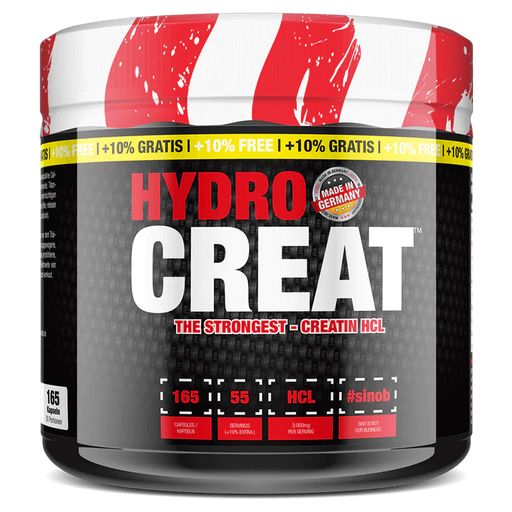Creatine HCL
Filters
-
 Save 11%
Save %
Original price €38,90Original price €38,90 - Original price €38,90Original price €38,90Current price €34,62€34,62 - €34,62Current price €34,62| /
Save 11%
Save %
Original price €38,90Original price €38,90 - Original price €38,90Original price €38,90Current price €34,62€34,62 - €34,62Current price €34,62| /Hydro Creatine HCl · 165 capsules
#sinob1 reviewPractical capsule form: Ideal for on the go and easy dosing with 1,000mg creatine HCL per capsule. Increases performance: Increases explosive p...
View full detailsOriginal price €38,90Original price €38,90 - Original price €38,90Original price €38,90Current price €34,62€34,62 - €34,62Current price €34,62| /Save 11% Save %
The effectiveness of creatine for building strength and muscle mass has been proven time and time again in clinical studies. As a result, creatine is an absolute MUST for bodybuilders, weightlifters and other athletes. Creatine research continues to make progress in improving this active ingredient and one of these rising new stars is creatine hydrochloride (creatine HCL for short).
What is creatine HCL?
As the name suggests, creatine HCL is produced by attaching an HCL group to the creatine molecule, creating a creatine salt. The addition of the hydrochloride group greatly improves the solubility of the molecule compared to creatine monohydrate (the basic form of creatine). This results in improved qualities compared to the already excellent creatine monohydrate.
Creatine monohydrate vs. creatine HCL
Creatine HCL is the most soluble form of creatine available on the market. As a result, creatine HCL may have higher bioavailability and faster and better absorption compared to creatine monohydrate. This means that creatine HCL is basically a super concentrated form of creatine and that only a much lower dosage is needed to achieve the same results in terms of strength and muscle gains. In addition, you only need a small amount of liquid and therefore do not need to drink large amounts of liquid when taking creatine.
Although not common, some people experience mild side effects such as bloating, cramps and frequent urination when using creatine monohydrate. These side effects are completely harmless to health, but can be perceived as annoying. Creatine HCL is reported to have no such side effects.
For maximum efficiency of creatine monohydrate, a so-called loading phase is often recommended, during which large amounts of creatine (20 grams per day) are consumed. Due to the higher bioavailability and better absorption of creatine HCL, such a loading phase is not necessary. In addition, creatine HCL does not require cyclical intake.
Creatine HCL research
This product was patented not so long ago in 2009. As it is still a relatively new product, most sports scientists have not yet had the opportunity to carry out studies with this active ingredient. However, in 2009 an article was published on the efficacy of Polyethylene Glycosylated Creatine Hydrochloride (PEG Creatine HCL) which showed that a low dose of PEG Creatine HCL (1.25g) had a similar performance enhancing effect to a significantly higher dose of Creatine Monohydrate (5g). PEH Creatine HCL is a modified version of Creatine HCL and is also currently available on the market. Although no studies using creatine HCL are currently available, the results of the PEG creatine HCL study may be transferable to regular creatine HCL as the benefits of these two compounds are similar.
Feedback from creatine HCL users
It's hard to ignore the large amount of positive feedback from creatine HCL users. Even without published scientific research on this product, this feedback was to be expected as the underlying rationale behind this product looks conclusive. People who have tried creatine HCL do indeed confirm reduced side effects as well as increases in strength, muscle mass and energy. It shouldn't be too long before the science catches up and the benefits of creatine HCL are clinically confirmed.
Disadvantages of creatine HCL
The only complaint found in user feedback is the relatively high cost of creatine HCL supplementation compared to creatine monohydrate. Even though one gram of creatine HCL is equivalent to 5 grams of creatine monohydrate in terms of its effect, creatine HCL is still comparatively expensive. However, this is to be expected with new breakthrough products and prices may fall in the future.
Recommended intake
Unlike creatine monohydrate, you only need one gram of creatine HCL per day. To increase absorption, it is best taken with a sugary drink such as juice or as part of a post-workout shake.
Creatine HCL supplements
Creatine HCL is available as a mono-preparation which, if you are not currently using a pre-workout supplement, can be taken about an hour before training to help increase your training potential.
Alternatively, creatine HCL is also available as part of pre-workout supplements that contain creatine HCL as well as other ingredients such as caffeine, which can be helpful in providing additional nutrients and can also provide other benefits in addition to the benefits of creatine HCL.
Similar to creatine monohydrate, creatine HCL can also be used as a post-workout supplement or as part of a post-workout blend to complement pre- and intra-workout supplementation and aid recovery.
Combination with other supplements
Creatine HCL can be combined with other forms of creatine such as creatine monohydrate. Alternatively, it can also be used instead of creatine monohydrate. In this case, creatine HCL together with protein becomes a fundamental supplement that can be combined with any other supplement to achieve individual goals.
Conclusion
Creatine HCL is a product that is definitely worth a try. The strongest arguments in favor of creatine HCL are its improved bioavailability and the elimination of side effects compared to creatine monohydrate. Even though creatine HCL is more expensive than creatine monohydrate, these benefits may make creatine HCL a more attractive product, which should be especially true for people who suffer from side effects when using creatine monohydrate.
References:
- Herda et al (2009), Effects of creatine monohydrate and polyethylene glycosylated creatine supplementation on muscular strength, endurance, and power output. J Strength Cond Res, 23: 818-826

